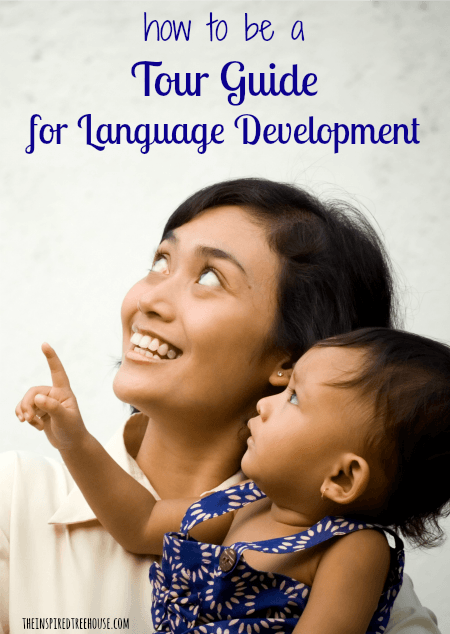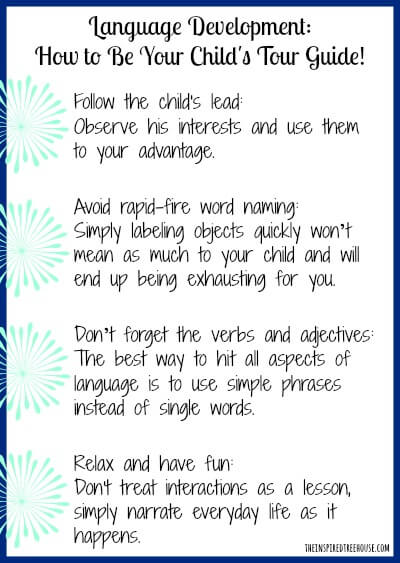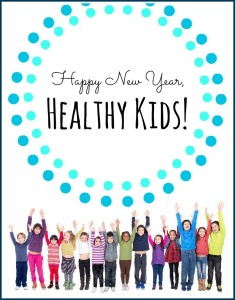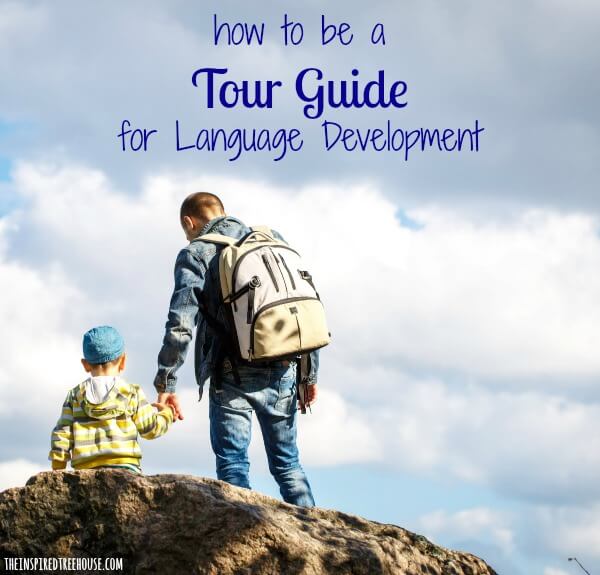
This post is part of our Happy New Year, Healthy Kids series, with 20 expert bloggers weighing in about their best tips for raising happy, healthy kids in 2015! For the rest of the month, this series of posts will cover everything from creativity and sleep to social development and nutrition (and much more!). Click here to learn more!
We’re so excited to welcome our friend, speech-language pathologist Rebecca Bowen, to The Inspired Treehouse for today’s guest post! Rebecca is a fellow pediatric therapist working at the Center for LifeSkills in Ohio. She is also currently working to bring the Timbernook program to Northeast Ohio. Rebecca is here today to talk about the best ways to promote language development in young children. Take it away Rebecca!
HOW TO BE A TOUR GUIDE FOR LANGUAGE DEVELOPMENT
When babies arrive, they are strangers in an unfamiliar land who don’t speak the language. But luckily, you do, and you will be their guide through crazy the adventure that is babyhood.
When your baby is born, every single experience is new: the way Mom smells, the light coming in the window, the sound of Dad’s voice, the way the dog’s fur feels. Every experience creates new pathways in your child’s rapidly developing brain.
Early childhood has been called the critical period for language development. This means that children’s brains are hardwired to learn language during this time. The bad news? If children aren’t exposed to a language-rich environment at an early age, it may be difficult or even impossible to learn language later in life.
So this means what you do (or don’t do) as a parent literally changes the structure and function of your baby’s brain. Yikes, that’s a lot of responsibility, right?
Don’t worry, there’s good news, too! Babies are like little sponges, absorbing new words at an amazing rate. Luckily, with a little effort you can make any daily activity – no matter how mundane – a fun, enriching, language-learning experience.
And on your left … the changing table!
Imagine you’re in a foreign country. You come upon a city. You can see an enormous building, feel the cool stone, smell the moss and hear the creaky wooden floor. But what is it called? Who built it? What was it used for? Who lived here?
While you can gather a lot of information using your senses, you have no way of truly understanding what you’re experiencing. You need a tour guide!
In 2015 let’s be language tour guides for our babies and toddlers every day!
When it comes to understanding the world, you are your child’s tour guide. You provide the words, context, and experiences necessary for your child to begin connecting objects and people with their names and functions.
Babies also take in information through their senses. They hold something soft, it’s brown and fuzzy, it smells like laundry detergent, it tastes slightly salty, it rattles when shaken. You see your child playing and say “Oh, you found your teddy bear rattle! Shake him some more!”
Boom. You’ve just led your first tour. You just named the object, explained what it’s used for, taught a new verb and gave your baby warm, positive attention. Wow, you’re good!
Some examples of how to narrate common activities during your day to help build strong connections in your baby’s brain:
“Ooh, you have a stinky diaper. Let’s put you on the changing table and clean you up.”
“Uh-oh your cup fell down on the floor. I’ll pick it up.”
“Listen, my phone is dinging. Grandma just sent us a text.”
Try some of these out during the day and then start to improvise.

Here are some tips for encouraging language development in your child from birth into toddlerhood and beyond:
- Follow your baby’s lead. If she’s really into the dust particles floating in a sunbeam, talk about that. Is he fascinated by his reflection in a mirror? Perfect topic for discussion.
- Avoid rapid-fire word naming: “Look here’s a train. And there’s a bear! Oh! Look here’s a cup.” Simply labeling objects quickly without providing context and explanation won’t mean as much to your child and will end up being exhausting for you.
- Don’t forget the verbs and adjectives. The best way to hit all aspects of language is to use simple phrases instead of single words. Example: “You’re holding your red cup. Let’s drink some milk.”
- Relax and have fun. If you treat these interactions as a lesson or chore, your child will pick up on it. Simply narrate everyday life as it happens and it will quickly become second nature. Trust me, it can become such a habit that you’ll catch yourself doing it even when kids aren’t around, and that can be a little awkward. Imagine a dad pointing out an airplane flying overhead to his buddies during a round of golf – true story! J
Babies really are new arrivals in a foreign country where they don’t speak the language. Luckily, they have the world’s best tour guides – mom and dad – to show them around!
Rebecca Bowen
Latest posts by Rebecca Bowen (see all)
- THE ULTIMATE SENSORY EXPERIENCE FOR KIDS - March 18, 2016
- STUTTERING: WHEN TO WORRY AND HOW TO HELP - November 8, 2015
- SOCIAL SKILLS: 5 TIPS TO HELP SHY KIDS MAKE FRIENDS - September 30, 2015



[…] of childhood and the single most significant contributor to healthy development in kids. From language development to motor development to cognitive development and everything in between, play is the catalyst for […]